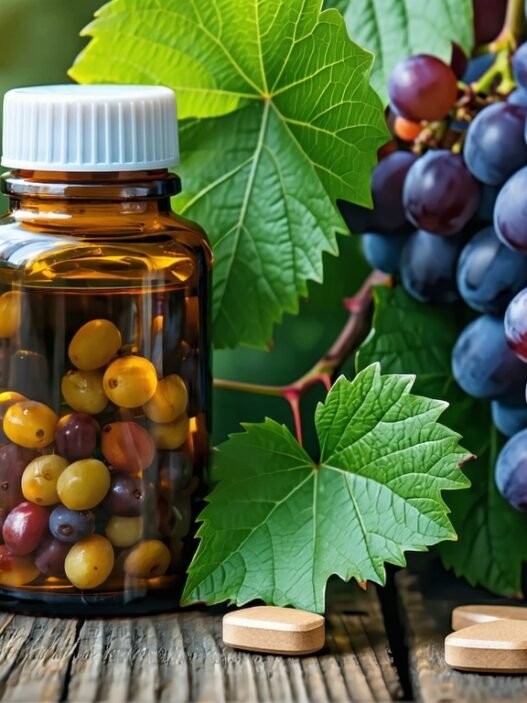Understanding Resveratrol
Introduction to Resveratrol
Resveratrol is a polyphenol that is primarily found in the skin of red grapes, as well as in peanuts, red wine, and certain berries. It has gained attention not only for its potential health benefits but also for its possible role in promoting hair growth. Research has shown that resveratrol can enhance hair growth by stimulating the hair growth cycle and improving overall follicle health.
One notable study indicated that topical application of resveratrol significantly promoted hair growth by transitioning hair from the telogen (resting) phase to the anagen (growth) phase on shaved mice. Additionally, experiments demonstrated an increase in hair shaft length in human hair follicles when treated with resveratrol.
Sources of Resveratrol
Resveratrol is derived from several natural sources. The key sources include:
| Source | Resveratrol Content |
|---|---|
| Red Grapes | High |
| Red Wine | Moderate to High |
| Peanuts | Moderate |
| Berries (e.g., mulberries, blueberries) | Moderate |
| Polygonum cuspidatum | High in supplements |
Many resveratrol supplements available in the U.S. are made from red wine or red grape extracts and may also include extracts from the Asian plant Polygonum cuspidatum (WebMD). This variety of sources allows individuals to incorporate resveratrol into their diets through food or as dietary supplements. To learn more about the benefits of these sources, consider exploring our articles on resveratrol foods and resveratrol supplements.
Resveratrol’s growing popularity in the health and wellness industry highlights its potential as a natural solution for various health concerns, including its promising effects on hair growth.
Resveratrol and Anti-Aging
Resveratrol is not just a popular topic in discussions about longevity; it has also gained recognition for its potential anti-aging benefits. Recent research suggests that this powerful antioxidant may play a significant role in promoting overall health and well-being as individuals age.
Potential Anti-Aging Effects
Resveratrol’s anti-aging effects are linked to its ability to activate the SIRT1 gene, which is thought to help protect the body against obesity and aging-related diseases. Studies indicate that resveratrol may enhance longevity by promoting cellular health and function. It has been noted that this compound exhibits promising antiviral, anti-inflammatory, and anticancer effects in animal and lab studies, though more human studies are needed to confirm these findings (WebMD).
| Anti-Aging Benefits | Description |
|---|---|
| Activation of SIRT1 Gene | Protects the body from effects of aging and obesity. |
| Antioxidant Properties | Neutralizes free radicals, reducing cellular damage. |
| Potential Disease Prevention | May combat inflammation and support overall health. |
Role of Resveratrol in Disease Prevention
In addition to its anti-aging effects, resveratrol plays a significant role in disease prevention. Research suggests that it may help protect against heart disease by reducing inflammation, lowering LDL cholesterol, and preventing clot formation that can lead to heart attacks. Furthermore, resveratrol has been found to aid in preventing insulin resistance, making the body more sensitive to insulin and subsequently reducing the risk of developing diabetes.
| Disease Prevention | Mechanism |
|---|---|
| Heart Disease | Reduces inflammation, lowers LDL cholesterol, prevents clots. |
| Diabetes | Improves insulin sensitivity to prevent insulin resistance. |
These findings highlight the potential of resveratrol as a multi-faceted compound beneficial for health and longevity. For those interested in enhancing their health with resveratrol, consideration of its health benefits and appropriate supplementation through resveratrol supplements may be worthwhile.
Resveratrol and Heart Health
Resveratrol is considered a valuable compound for promoting heart health. Its potential effects on heart disease and cholesterol levels have garnered considerable interest.
Impact on Heart Disease
Resveratrol may help protect against heart disease by reducing inflammation, lowering LDL cholesterol, and preventing clot formation that can lead to a heart attack.
Research indicates that the anti-inflammatory properties of resveratrol could play a crucial role in combating cardiovascular issues. By mitigating inflammation within the cardiovascular system, resveratrol may enhance overall heart function and reduce the risk of coronary artery disease. Its ability to promote healthy blood flow also supports heart health, contributing to a lower incidence of heart-related illnesses.
Effects on Cholesterol Levels
Resveratrol has been shown to assist in lowering LDL (low-density lipoprotein) cholesterol levels, which is often referred to as “bad” cholesterol. Elevated levels of LDL cholesterol can lead to plaque buildup in arteries, increasing the risk of cardiovascular diseases.
| Cholesterol Type | Effect of Resveratrol |
|---|---|
| LDL Cholesterol | Lowers levels |
| HDL Cholesterol | May maintain or increase levels |
This balance between lowering harmful cholesterol while potentially improving HDL (high-density lipoprotein) cholesterol—the “good” cholesterol—further supports cardiovascular health. The comprehensive benefits of resveratrol on heart health are still being explored, and while its protective qualities are promising, further research is necessary to conclusively establish dosage and optimal usage.
For more detailed insights on how resveratrol supports heart health, you can check our article on resveratrol for heart health. Always consult healthcare professionals before starting any new supplement, especially for adults aged 35 and up who are looking for longevity and anti-aging benefits.
Resveratrol and Diabetes
Resveratrol plays a significant role in diabetes management by impacting insulin resistance and enhancing sensitivity to insulin. Understanding these effects is essential for those looking to leverage natural solutions for blood sugar regulation.
Prevention of Insulin Resistance
Resveratrol is believed to help prevent insulin resistance, which is a condition where the body’s cells become less responsive to insulin, leading to elevated blood sugar levels. Studies indicate that resveratrol can improve insulin sensitivity, making it a potential ally for individuals at risk of developing diabetes (WebMD). By enhancing the body’s reaction to insulin, resveratrol may assist in maintaining healthier blood sugar levels and reducing the risk of diabetes.
| Effect of Resveratrol on Insulin Resistance | Observation |
|---|---|
| Improved insulin sensitivity | Helps cells respond better to insulin |
| Reduces blood sugar levels | Assists in maintaining stable glucose levels |
| Supports metabolic function | Encourages healthy metabolism |
Sensitivity to Insulin
In addition to preventing insulin resistance, resveratrol enhances sensitivity to insulin, allowing for better glucose uptake into cells. This sensitivity is crucial for individuals with or at risk of diabetes, as it helps maintain balanced blood sugar levels and reduces the likelihood of metabolic complications (WebMD). The activation of the SIRT1 gene by resveratrol is a key mechanism thought to contribute to these benefits. This gene is known for protecting the body against obesity and aging-related diseases.
| Benefit of Increased Insulin Sensitivity | Result |
|---|---|
| Better glucose uptake | Cells use glucose efficiently |
| Potential weight management | Helps regulate body weight |
| Lower risk of type 2 diabetes | Reduces overall diabetic risk |
Integrating resveratrol into a balanced diet, perhaps through resveratrol foods or resveratrol supplements, may provide essential health benefits, particularly for blood sugar regulation and overall metabolic health. Those interested in exploring this further should also consider discussing it with healthcare professionals to ensure safety and efficacy.
Resveratrol for Hair Growth
The potential of resveratrol in promoting hair growth is gaining attention, particularly among those seeking natural solutions for thinning hair. This section will explore the current studies on resveratrol and its mechanisms in enhancing hair growth.
Studies on Resveratrol for Hair
Research has indicated that resveratrol (RES), when encapsulated in an active carrier known as PPD-Lip, can significantly promote the proliferation of dermal papilla cells. This process is essential for hair growth as it directly influences the hair growth cycle. The studies showed that using PPD-Lip@RES led to more substantial hair regeneration with less hair shedding compared to traditional treatments like minoxidil (NCBI).
In particular, PPD-Lip@RES displayed impressive therapeutic effects in severe androgenetic alopecia, even outperforming finasteride, a commonly used drug for hair loss. It effectively addressed both pathological and physiological processes that contribute to hair loss, suggesting its multifaceted role in hair health.
Furthermore, the anti-inflammatory properties of RES are critical, as excessive inflammation and oxidative stress are key contributors to abnormal hair follicle microenvironments. By restoring this balance, resveratrol can help to promote a healthy environment for hair growth.
Mechanisms of Hair Growth Promotion
The mechanisms through which resveratrol promotes hair growth are primarily attributed to its antioxidant and anti-inflammatory properties. RES has been shown to facilitate the proliferation of dermal papilla cells and prevent oxidative damage caused by hydrogen peroxide (H2O2), which are vital for hair growth.
Additionally, nanovesicles loaded with RES significantly enhance its solubility, stability, and skin penetration, amplifying its biological activity. This improved delivery method offers a promising approach for treating hair loss more effectively. As the body continues to explore the benefits of resveratrol, its application in hair care may represent a natural and powerful alternative to conventional treatments.
Those interested in the broader health aspects of resveratrol can explore more about resveratrol benefits and its role in resveratrol for skin. For those considering supplements, it’s advisable to read about resveratrol supplements to understand their proper usage and potential effects.
Resveratrol Supplements
The use of resveratrol supplements has gained popularity among those seeking natural solutions for health enhancement, including hair growth. However, there are important safety concerns and recommendations for their use that should be considered.
Safety Concerns
While resveratrol is touted for its potential health benefits, it is crucial to approach supplements with caution. The current body of research on resveratrol supplements is limited, making it difficult to ascertain their overall efficacy and safety (WebMD). Key points to consider include:
- Limited Research: Most studies focus on resveratrol in foods rather than supplements, and results on the effectiveness of supplements for anti-aging or disease prevention are inconclusive.
- Pregnancy and Breastfeeding: Resveratrol supplements are not recommended for children or women who are pregnant or breastfeeding.
- Dosage Concerns: Most available supplements contain lower doses than those cited in research studies, raising questions about their effectiveness.
- Potential Side Effects: Individuals may experience adverse reactions, though specific side effects related to resveratrol are not widely documented.
Recommendations for Use
For longevity and anti-aging enthusiasts considering resveratrol supplementation, the following recommendations may help guide their choices:
- Consult with a Healthcare Professional: It is advisable to speak with a doctor before starting any supplement, especially for those with existing health conditions or those taking other medications.
- Focus on Dietary Sources: Instead of supplements, individuals may benefit more from incorporating natural sources of resveratrol, such as grapes, berries, and peanuts, into their diets. Explore more about dietary options at resveratrol foods.
- Be Cautious: If choosing to use supplements, select products from reputable brands that provide transparency in labeling and testing.
- Monitor Health: Regular health check-ups and monitoring for any changes in health conditions or side effects after starting supplementation are essential.
While the interest in resveratrol for hair growth and other health benefits continues to grow, it is paramount for individuals to prioritize their safety and make informed choices based on credible information and professional guidance. For further insights into the various advantages of resveratrol, please refer to articles on resveratrol benefits and resveratrol health benefits.





















